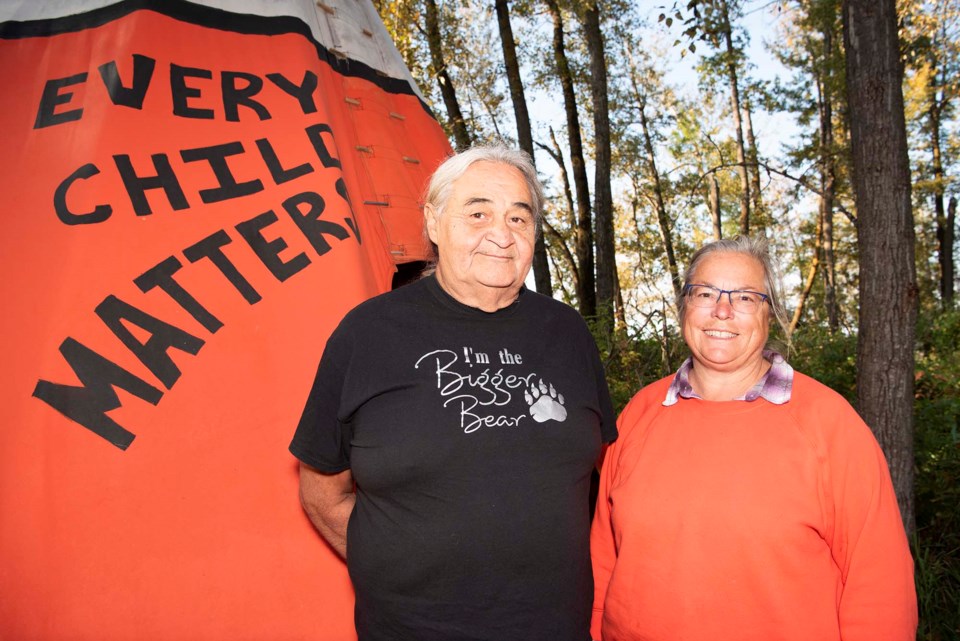A Sturgeon County farmer has teamed up with a First Nations elder to create a healing forest dedicated to reconciliation.
Prairie Gardens and Adventure Farm co-owner Tam Andersen and Elder Bill Bertschy have established the Payhonin National Healing Forest on Andersen’s farm near Bon Accord. The forest will hold its grand opening on Sept. 30, which is the National Day for Truth and Reconciliation. (Payhonin is a Cree word for “gathering place.”)
The forest is a 25-acre patch of parkland boreal forest that dates back to pre-settlement times and has never been cleared for agriculture, Andersen said. She and Bertschy have added some teepees, wood carvings, and a short trail to it so it can serve as a place to learn about Indigenous culture and farming practices.
“As a colonialist and a farmer, I feel I have a responsibility to learn land-based ways of doing things,” Andersen said, and to recognize and connect with Indigenous knowledge.
Andersen and Bertschy said they plan to host free and paid activities at the site, including nature walks, talks on the Seven Grandfather Teachings (wisdom, love, respect, bravery, honesty, humility, and truth), and various First Nations ceremonies. Guests will also learn about sustainable agriculture at the Three Sisters Garden, which features corn, beans, and squash (crops First Nations communities traditionally planted together for their synergistic benefits).
Bertschy said the forest contains many plants and animals significant to First Nations culture, such as moose and blueberries. It also has plots for tobacco, sweetgrass, and other ceremonial plants. He said he hoped it would help people connect with nature to find healing.
“When you’re in a forest, here you can find your answers.”
National project
Healing forests are a concept promoted by the National Healing Forests Initiative as a way to encourage Indigenous and non-Indigenous communities to create green spaces that honour the victims and survivors of Canada’s residential school system, missing and murdered Indigenous women, and children taken from their families through the Sixties Scoop.
Initiative co-founder Peter Croal said he got the idea for this project in 2015 during a healing walk held following the release of the Truth and Reconciliation Commission’s report on residential schools. While Canadians could talk about reconciliation in churches and conference rooms, he realized those indoor places were rooted in the same culture that created residential schools and could hinder those discussions.
“We need outdoor spaces to talk about reconciliation,” he said.
Croal shared his idea to promote outdoor healing forests with fellow walk participant Patricia Stirbys. The two of them are now spreading the idea nationwide with the help of the David Suzuki Foundation and the Royal Geographical Society of Canada.
Anyone can create a healing forest, and it can take any form, Croal said. There’s one in Cape Breton that is a two-kilometre trail and forest where students learn from area elders, for example, and another in an Ottawa churchyard which consists of a 20’-by-50’ plot with rocks and ceremonial plants in it. What matters is that the forest is outdoors, focused on reconciliation, and created in partnership with local Indigenous communities.
Croal said there are 18 official healing forests in Canada as of this month with 15 more in the works. Alberta has healing forests in Sturgeon County and in Leslieville west of Red Deer.
Healing forests mesh well with the Suzuki Foundation’s interests in conservation and Indigenous peoples, said spokesperson Jode Roberts. The foundation is giving 34 groups (including Andersen and Bertschy) $1,500 each this year to take part in online networking sessions on how to establish healing forests.
Andersen said she and Bertschy plan to keep most of the Payhonin forest undeveloped, although they hoped to add a trail shaped like the Big Dipper later.
Bertschy said he sees healing forests as a way for Indigenous peoples to take the lead in reconciliation.
“If we can get teachings out and healing out, it should help all.”
The Payhonin National Healing Forest is at 23414 TWP 564 in Sturgeon County northeast of Prairie Gardens. The grand opening runs from 11 a.m. to 2 p.m. Call 780-921-2272 for details.




